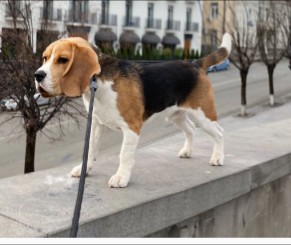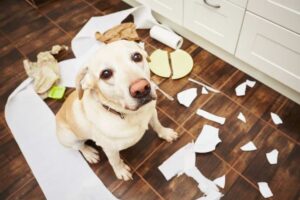Have you ever noticed that your dog prefers to eat at night? Of course, this is a common behavior among animals. “But why does my dog only eat at night” you might ask.
Well, many different factors contribute to your dog’s eating habits. Sometimes dogs eat at night out of habit. Other times this may be because of comfort or convenience. Below you will find everything you need to know about dog eating habits and how they affect the time of day your dog eats.
Before scrolling down to the answer of this guide “Why Does My Dog Only Eat At Night,” check out these topics from our team: Why Won’t My Dog Eat in the Morning and Why is My Dog Eating Grass Franctically?
Reasons Why Your Dog Only Eats At Night
Some common factors influence the time of day your dog eats. These factors may apply to some dogs, while others may have different reasons.
However, always keep in mind that if your dog’s eating habits change dramatically, it may be time to consult a veterinarian. A vet can determine any underlying health problems occurring. Otherwise, if your dog always eats at night, it is likely due to one of the reasons below.
1. Habit
If your dog has always eaten at night, it will likely continue this behavior out of habit. Like the way humans eat around the same time every day, dogs will eat simultaneously because they associate that time with food.
If they have always eaten at a specific time, their bodies will expect food at that given time. This habit may start in different ways. For example, your dog may develop this habit as it notices that the food is fresher at night because that is when you fill its bowl.
Another dog may start eating at night because it waits until its owner comes home from work. This habit might form for many other reasons, but it can be hard to break once created.
Related: Why is My Dog Licking The Floor
2. Comfort
Your dog’s level of comfort can also affect its eating habits. Only eating at night can influence your dog’s comfort level with people. Some dogs prefer to eat when no one is watching, while others may not eat without their owner around.
This behavior largely depends on your dog’s unique personality and quirks. For example, if your dog does not like eating with people around, it may wait until later when someone is less likely to be watching.
This is especially applicable for dogs whose food dishes may be in a busy house area. On the other hand, your dog may wait for you to come home from work to eat. So, even if your dog has food available all day, it may choose to eat with you.
3. Convenience
Your dog may only eat at night out of convenience. Adult dogs typically sleep for 12 to 14 hours a day. Much of this time is during the day when their families are at school or work. Therefore, eating at night may be the most convenient option because your dog is actually awake to eat.
Additionally, it has been found that free-feeding dogs can sometimes lead to dogs only eating at night. Free-feeding is providing your dog with a bowl of food at all times. Therefore, your dog can choose whatever time it wants to eat. This freedom means that some dogs only eat at night simply because they want to. The convenience of free-feeding allows your dog to set its own schedule.
4. Food Choice
Your dog may only eat once a day simply because it does not like its food. Dogs will eat when they get hungry, but if they do not like the food you give them, they might hold off as long as possible. If you notice your dog does not eat its breakfast, it may be time to try different food.
Related: Worst Dog Food Brands to Avoid and Best Soft Dry Dog Foods.
Is It Safe For Dogs to Only Eat at Night?
Generally speaking, dogs should be eating two meals a day. Ideally, these meals would be spread out with one in the morning and one in the evening. However, as we mentioned, there are reasons your dog may only eat once a day.
If you free-feed your dog and it chooses to only eat once a day, it is ok. The biggest concern is ensuring that your dog is eating the proper amount of food and nutrients.
If your dog can regulate its own eating without gorging, then this method is fine. However, if you want your dog to follow a strict morning and evening food schedule, it is best to start training. You should start by giving your dog a bowl of food in the morning and if it does not eat it, take it away until the evening.
This removes the ability to eat at all times, so your dog feels more inclined to eat when the food is given. After repeating this process multiple times, your dog will learn to eat the food when it is given.
Essential Factors in Dog Eating Habits

Size
Small dogs require less food than larger dogs. Notably, small dogs have higher metabolisms because they have smaller intestinal tracts. Because of this, it is recommended that your small dog gets multiple meals a day as they process the meals faster.
If your small dog is only eating at night, it is highly recommended to start it on a feeding schedule. You can make the meals smaller but more frequent, which will motivate the dog to eat multiple times during the day rather than just at night.
Related: Schnoodle Size Guide.
Age
As dogs grow older, they eat less. This is primarily due to physical changes in their bodies that require less energy. For example, older dogs often develop arthritis which causes them to be less active.
Because they are less active, they are burning fewer calories and therefore require less food. Additionally, older dogs in pain may eat less simply because they do not have the energy to go to their food bowls.
Therefore, as your dog ages, it may begin to eat only at night. If this happens, take your dog to the vet to ensure no underlying health problems are present. Additionally, moving your dog’s food closer to your dog may also motivate it to eat during the day rather than just at night.
Related: Police Dog Lifespan – How Long Do They Serve and Live?
Energy Level
Higher energy levels require more significant amounts of food. This is because the more energy your dog has, the more active it will be and the more calories it will burn. Therefore highly active dogs require more food to replenish their calories.
If you have an extremely active dog, it is essential to ensure it is eating multiple times a day. Otherwise, your dog may become malnourished. On the other hand, if your dog is more sedate, it may not feel the need to eat numerous times a day because it burns fewer calories.
That being said, even if your dog is less active, you must still ensure it is getting the proper amount of food for a dog its size. A vet can help you determine the appropriate food intake for your dog’s energy level.
Health
Your dog’s health plays a significant role in its eating habits. Many dogs who suffer from digestive problems need to be fed smaller, more frequent meals to be appropriately processed.
Therefore, if your dog has known digestive issues, you must begin a feeding schedule that ensures your dog eats more than once a day. Obesity is another health problem that requires careful monitoring of your dog’s food intake.
If your dog suffers from obesity, you should avoid free-feeding as your dog can overeat quickly. If your dog only eats at night, it is possible to overeat because of the hunger that builds during the day. If this is the case, you should put your dog on an eating schedule that ensures it eats twice a day, preventing overeating.
Dog Product Recommendations: Best Dog Foods For Joint Health.
Notes on Bloat and Nighttime Eating

This can lead to restlessness, vomiting, swelling, and collapse. Therefore, it is vital to avoid behaviors that might trigger this problem, such as only eating once daily. When dogs only eat once a day, they are more likely to overeat and experience this problem.
This is because bloat is often caused by consuming large amounts of food too quickly. Therefore, if your dog only eats at night, it is more prone to this problem. In addition, bloat can be extremely painful for dogs.
If you find your dog waiting all day to eat and then overeat, it is time to start a more strict feeding schedule. You will find that your dog is happier and healthier this way.
Conclusion For “Why Does My Dog Only Eat At Night”
As you can see, there are many reasons your dog only eats at night. Generally, dogs should eat at least twice a day. So, creating a food schedule to encourage your dog to eat in the morning too can be helpful for your dog’s overall health.
For more content similar to “Why Does My Dog Only Eat At Night,” from We Love Doodles, you can check out:
You can learn more about your dog’s eating behavior by watching “My Dog Won’t Eat Their Food – What to Do About It” down below:

Andy is a full-time animal rescuer and owner of a toy doodle. When he’s not saving dogs, Andy is one of our core writers and editors. He has been writing about dogs for over a decade. Andy joined our team because he believes that words are powerful tools that can change a dog’s life for the better.
Why Trust We Love Doodles?
At We Love Doodles, we’re a team of writers, veterinarians, and puppy trainers that love dogs. Our team of qualified experts researches and provides reliable information on a wide range of dog topics. Our reviews are based on customer feedback, hands-on testing, and in-depth analysis. We are fully transparent and honest to our community of dog owners and future owners.




